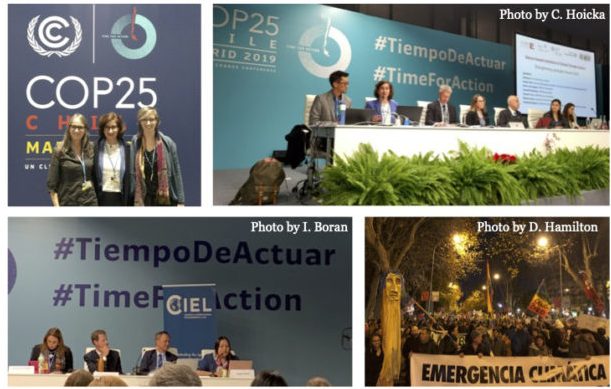Tyler McKay | Assistant News Editor
Featured Image: Many panels and discussions took place during the week of the conference. | Courtesy of York University Twitter
On Tuesday, January 14, panels were held to discuss York’s delegation to the 25th Conference of the Parties (COP25) in Madrid, Spain. The conference was held from December 2 to December 13, 2019.
There were two panels with three speakers each. The first was called, “Governance, Indigenous and Student Voices” and the second panel was called, “Blockchain for Climate and Green Buildings.” All of the speakers discussed their experiences at COP25.
Department of philosophy professor and the head of the York delegation Idil Boran, assistant professor in the school of gender, sexuality and women’s studies Angele Alook, and master’s student in disaster and emergency management Matthew Hampson comprised the first panel.
The second panel was made up of director of climate innovation at Ecotrust Canada Joseph Pallant, green buildings specialist at Ecology North Will Gagnon, and PhD candidate in organizational studies at Schulich Kam Phung.
Boran discussed how the conference was not as successful as they were hoping.
“We all went with the idea that this was going to be the COP of action; we left COP with quite a disappointment, but actually also a very revealing disappointment in the sense that what we are seeing today is that kind of contradiction between what the people want, what the activists, citizens, youth, and society wants, and what the governments are doing,” Boran said.
“That disparity has left a very distinctive, unmistakable imprint into the COP process,” she continued.
The conference was designed to take the next crucial steps in the UN climate change process with respect to the Paris Accords from back in 2016. However, this was not achieved.
“I am disappointed with the results of #COP25,” tweeted UN Secretary General António Guterres.
“The international community lost an important opportunity to show increased ambition on mitigation, adaptation & finance to tackle the climate crisis.”
Yet, Pallant made a point about the importance of pushing forward.
“I think multilateral, global consensus by governments representing their people to address climate change and to move forward is an extremely powerful force,” he said.
“To be most effective, we need to push hard and not give up.”
Furthermore, York sent a delegation of 15 people to this conference, yet not all delegates were from York. This is because, “the mandate is to community outreach and build collaborative efforts between the university and organizations that work on environmental issues,” explained Boran.
Fourth-year environmental studies student Rishav Panda says of the delegation that “it bridges the gap between the officials and the public. Students watching this type of event will gain an understanding of how the conferences are handled and what goes on.
“This can inspire young people to participate in future conferences and also to potentially network with other climate change activists or researchers,” he continues. All panel members mentioned this as a positive of the conference.
To cap off the panels, a trailer for a documentary Happening to Us, made by Inuit youth was shown by Youth Climate Report founder, Mark Terry.




